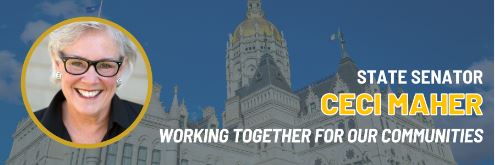Senator Maher Joins Passage Of Bill To Protect Environment, Expand Renewable Energy and Boost Green Jobs
Today, State Senator Ceci Maher (D-Wilton) joined the Senate’s final passage of a comprehensive bill that aims to protect the state’s environment while providing for the development of renewable energy sources and related job sectors in a manner that reduces costs connected with such protections and development.
House Bill 5004, ‘An Act Concerning The Protection Of The Environment and Development of Renewable Energy Sources And Associate Job Sectors,’ includes a list of policies that will support sustainable development, advance clean energy, invest in green jobs, and help both state agencies and local communities transition toward a carbon-free future.
“Record floods destroying infrastructure, rising tides threatening our coasts, heat waves spiking energy bills and putting vulnerable people at risk – now more than ever, we are seeing and living the impacts of our changing climate,” said Sen. Maher. “With these pressures in mind, achieving progress in protecting our environment is more important than ever, and this legislation helps our state advance. Increased focus on sustainability, energy efficiency, renewable energy and creating clean energy jobs is a pathway to setting our state up for long-term success.”
The bill passed the Senate 26-10 after previously passing the House. It now heads to the Governor’s desk to be signed into law.
Key components of the legislation include:
-Sets new goals for greenhouse gas emissions reductions—including an economy-wide net-zero target by 2050—without imposing costs on ratepayers.
– Supports clean energy jobs and businesses through tax incentives, benefit corporation fee vouchers, and a council to guide workforce transitions.
-Expands access to and develops strategic plans for clean technologies.
– Encourages heat pump deployment through strategic planning and school construction.
-Improves state and local sustainability planning with model purchasing policies, energy efficiency requirements, and climate strategy reports.
– Expands loan and grant programs to include more climate-smart projects and ensure funds benefit low-income residents and renters.
– Encourages solar through the study of solar canopy expansion.
– Encourages nature-based solutions for reaching our greenhouse gas reduction and other climate goals.
-Develops plans that address the triple impact of reducing energy costs, lowering emissions, and supporting climate resilience.
Share this page:
